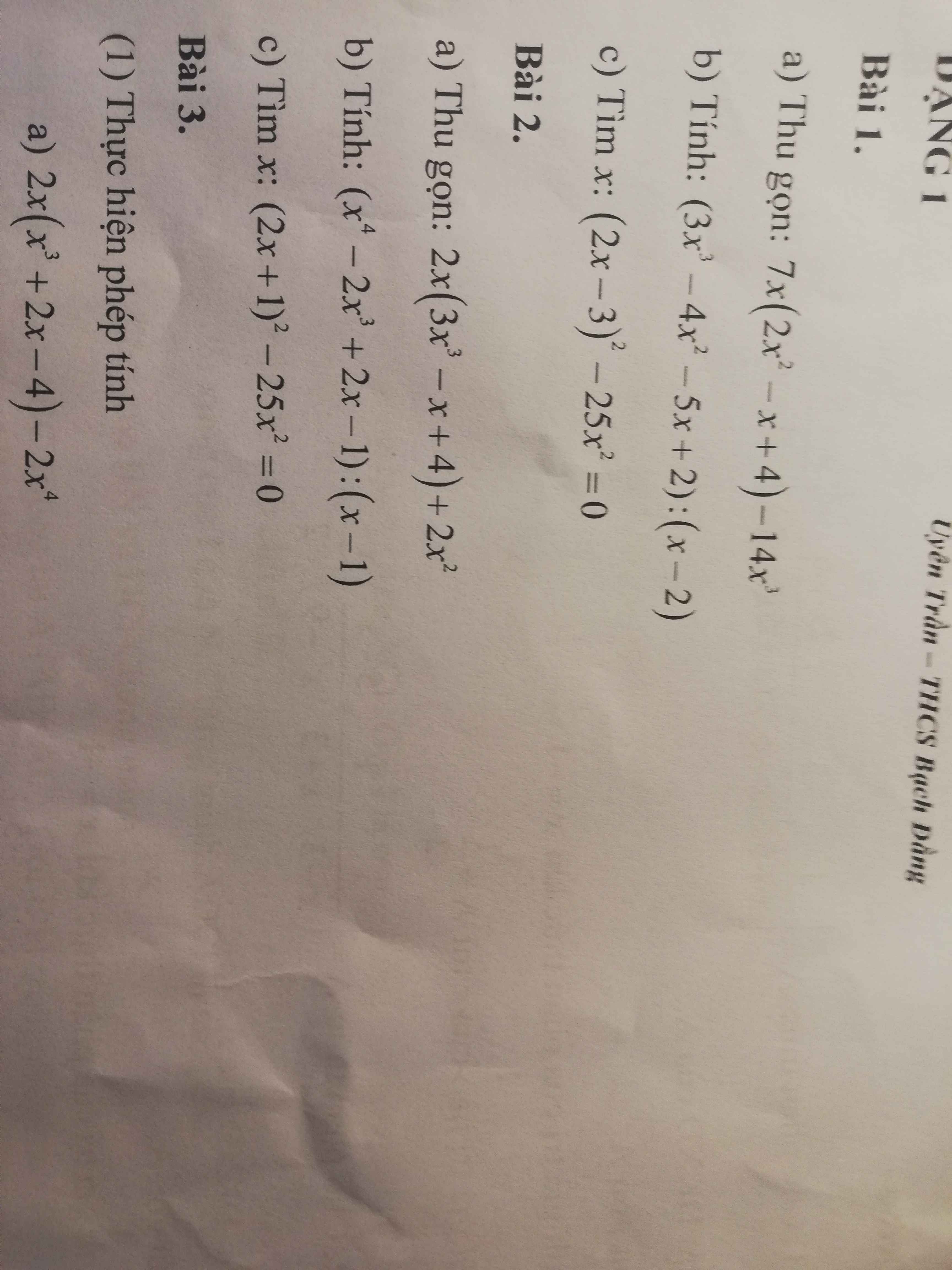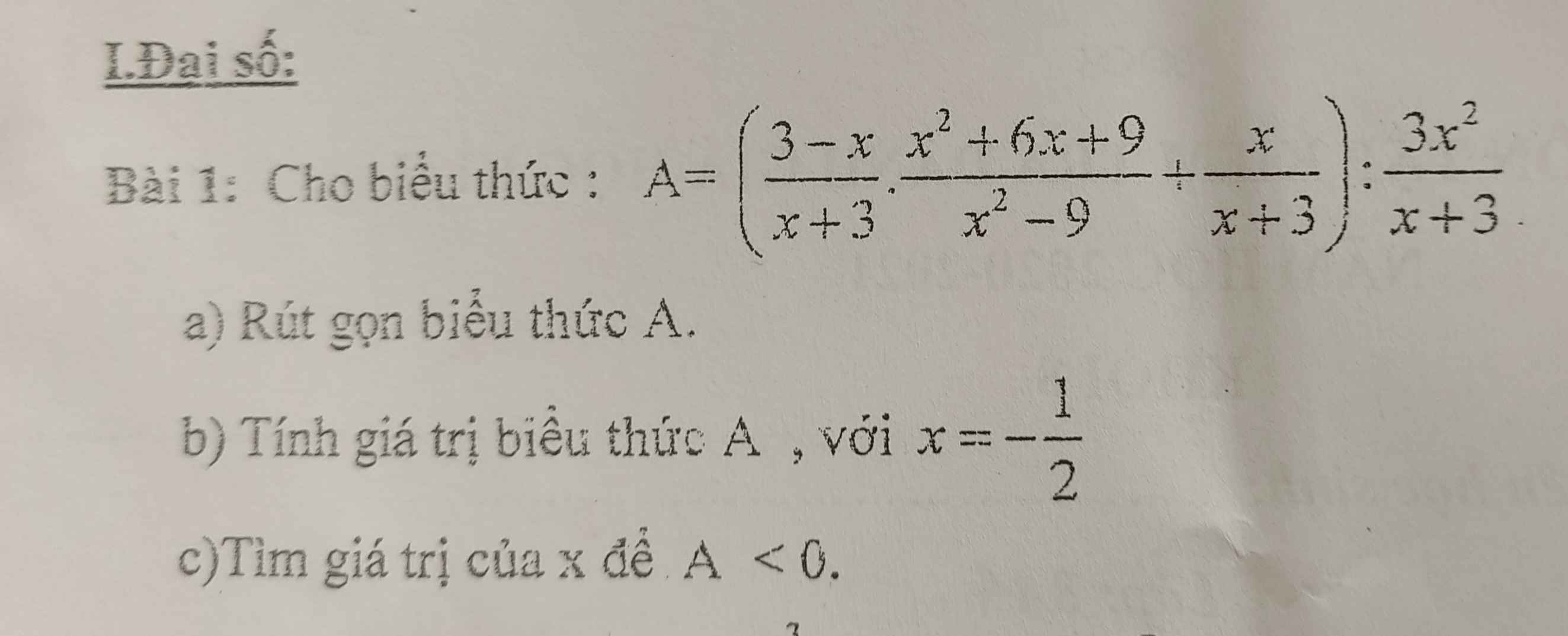
Hãy nhập câu hỏi của bạn vào đây, nếu là tài khoản VIP, bạn sẽ được ưu tiên trả lời.


\(=2x^2\left(x-1\right)-4x\left(x-1\right)=\left(x-1\right)\left(2x^2-4x\right)=2x\left(x-2\right)\left(x-1\right)\)

Bài 1:
a: Ta có: \(5x^2-\left(2x+1\right)\left(x-2\right)-x\left(3x+3\right)+7\)
\(=5x^2-2x^2+4x-x+2-3x^2-3x+7\)
=9
b: Ta có: \(\left(3x-1\right)\left(2x+3\right)-\left(x-5\right)\left(6x-1\right)-38x\)
\(=6x^2+9x-2x-3-\left(6x^2-x-30x+5\right)-38x\)
\(=6x^2-31x-3-6x^2+31x-5\)
=-8

Lời giải:
ĐKXĐ: $x\neq \pm 3; x\neq 0$
a. \(A=\left[\frac{-(x-3)}{x+3}.\frac{(x+3)^2}{(x-3)(x+3)}+\frac{x}{x+3}\right].\frac{x+3}{3x^2}\)
\(=\left(-1+\frac{x}{x+3}\right).\frac{x+3}{3x^2}=\frac{-3}{x+3}.\frac{x+3}{3x^2}=\frac{-1}{x^2}\)
b. Với $x=\frac{-1}{2}$ thì $x^2=\frac{1}{4}$
$\Rightarrow A=\frac{-1}{\frac{1}{4}}=-4$
c.
Với $x\neq 0, \pm 3$ thì $\frac{1}{x^2}>0\Leftrightarrow A=\frac{-1}{x^2}< 0$ với mọi $x\neq 0; x\neq \pm 3$
a) Ta có: \(A=\left(\dfrac{3-x}{x+3}\cdot\dfrac{x^2+6x+9}{x^2-9}+\dfrac{x}{x+3}\right):\dfrac{3x^2}{x+3}\)
\(=\left(\dfrac{-\left(x-3\right)}{x+3}\cdot\dfrac{\left(x+3\right)^2}{\left(x+3\right)\left(x-3\right)}+\dfrac{x}{x+3}\right):\dfrac{3x^2}{x+3}\)
\(=\left(\dfrac{-x-3+x}{x+3}\right)\cdot\dfrac{x+3}{3x^2}\)
\(=-\dfrac{1}{x^2}\)

\(7,\\ a,=\left(3x+1\right)^3\\ b,=\left(2x+3y\right)^3\\ c,mờ.quá\\ d,=\left(3x-1\right)^3\\ e,=\left(\dfrac{x}{2}+y^2\right)^3\\ 8,\\ a,=\left(x+3\right)^3\\ b,=\left(2-x\right)^3\)

c, \(x\)(\(x\) - 2022) + 4.(2022 - \(x\)) = 0
(\(x\) - 2022).(\(x\) - 4) = 0
\(\left[{}\begin{matrix}x-2022=0\\x+4=0\end{matrix}\right.\)
\(\left[{}\begin{matrix}x=2022\\x=4\end{matrix}\right.\)


\(x^4-3x^3-6x^2+3x+1\)
\(=x^4-2x^2+1-3x^3+3x-4x^2\)
\(=\left(x^2-1\right)^2-3x\left(x^2-1\right)-4x^2\)
đặt \(a=x^2-1\) khi đó biểu thức trở thành
\(a^2-3ax-4x^2\)
\(=a^2+ax-4ax-4x^2\)
\(=\left(a+x\right)\left(a-4x\right)\)
\(=\left(x^2+x-1\right)\left(x^2-4x+1\right)\)

( 2x - 1 ) - x = 0
=> 2x - 1 = x
=> 2x - x = 1
=> x = 1
( x - 1 )( 2x - 3) = 0
=> \(\orbr{\begin{cases}x-1=0\\2x-3=0\end{cases}}\)=> \(\orbr{\begin{cases}x=1\\x=\frac{3}{2}\end{cases}}\)
Vậy tập nghiệm của phương trình là S = { 1 ; 3/2 }
\(\frac{x}{x+1}=\frac{x+2}{x-1}\)( đkxđ : \(x\ne\pm1\))
( Chỗ này chưa học kĩ nên chưa hiểu lắm :]





Bài 1:
a: \(=14x^3-7x^2+28x-14x^3=-7x^2+28x\)
b: \(=\dfrac{3x^3-6x^2+2x^2-4x-x+2}{x-2}=3x^2+2x-1\)
c: \(\Leftrightarrow\left(2x-3-5x\right)\left(2x-3+5x\right)=0\)
=>(-3x-3)(7x-3)=0
=>x=-1 hoặc x=3/7